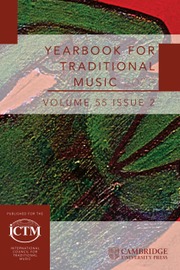Article contents
Sound Praxis, Poverty, and Social Participation: Perspectives from a Collaborative Study in Rio De Janeiro
Published online by Cambridge University Press: 06 December 2018
Extract
A long-standing and pervading theme in fields of inquiry such as economics, sociology, health studies, human rights, or social policy, poverty has apparently not similarly impacted scholarship on music beyond the implicit recognition—more typically found in folklore, ethnomusicology, and popular music studies—that it may have conditioned to some degree music-making among given groups within a larger society or even among larger societal entities such as countries and continents. One problem likely hindering more theoretical approaches to music and poverty is the difficulty, so often expressed in the above-mentioned fields, of finding a universally acceptable definition of poverty (not forgetting that defining “music” is also far from unproblematic). A growing literature, mostly beyond music disciplines, accounts for the many possible determining factors behind such a definition—such as family or individual income, gross national product, formal employment rate, average cost of a minimal caloric diet, access to basic sewage, and adequate housing—which may be adopted either in combination or in isolation. At the end of the twentieth and beginning of the twenty-first centuries, economists such as Amartya Sen, Mahbub Ul Haq, Deepa Narayan, Celso Furtado, and others went further in the pursuit of a multidimensional approach, considering factors such as education, availability of natural resources, and political participation in defining the boundaries indexing situations of poverty. Sen's (2010) definition of poverty as one's privation of developing individual capacities has since become an influential source of public debate (Crespo and Gurovitz 2002).
Abstract in portuguese
Amplamente analisado e debatido em áreas de estudo como economia, saúde, ou sociologia, o tema da pobreza aparentemente não teve um impacto significativo nas pesquisas acadêmicas sobre musica, para além do reconhecimento implícito que ela pode ter condicionado de alguma maneira o fazer musical entre determinados grupos sociais, países ou regiões mais amplas do mundo. Este artigo discute perspectivas multidisciplinares, mas principalmente aquelas propostas por economistas no final do século XX, em relação à experiência de pesquisa de um grupo formado por pesquisadores acadêmicos e moradores de um conjunto de favelas no Brasil, no intuito de explorar empírica e teoricamente as maneiras em que pobreza, desigualdades e práxis sonora são reciprocamente implicadas para além de especulações de sentido comum.
- Type
- Articles
- Information
- Copyright
- Copyright © 2013 by the International Council for Traditional Music
References
References Cited
- 17
- Cited by


